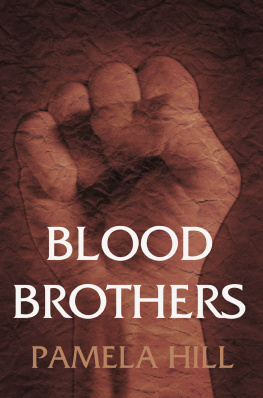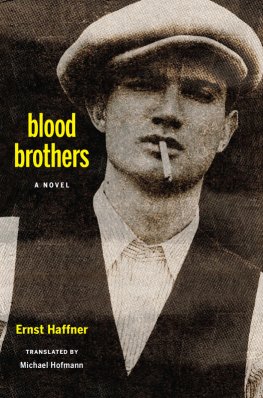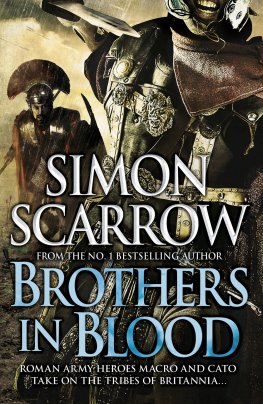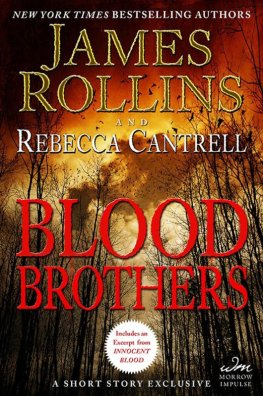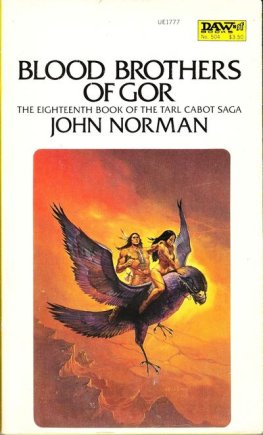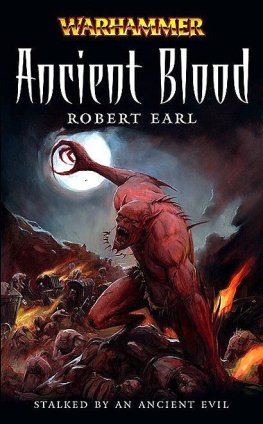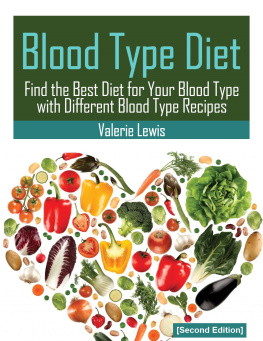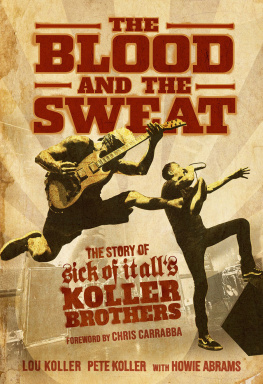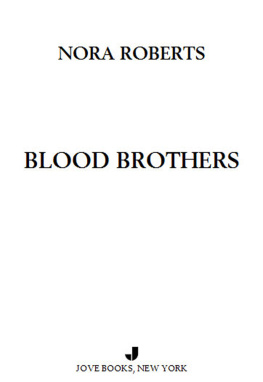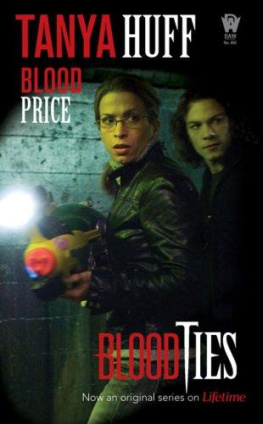BLOOD
BROTHERS
PAMELA HILL

Copyright 2014 Pamela Hill
The moral right of the author has been asserted.
Apart from any fair dealing for the purposes of research or private study, or criticism or review, as permitted under the Copyright, Designs and Patents Act 1988, this publication may only be reproduced, stored or transmitted, in any form or by any means, with the prior permission in writing of the publishers, or in the case of reprographic reproduction in accordance with the terms of licences issued by the Copyright Licensing Agency. Enquiries concerning reproduction outside those terms should be sent to the publishers.
Matador
9 Priory Business Park,
Wistow Road, Kibworth Beauchamp,
Leicestershire. LE8 0RX
Tel: (+44) 116 279 2299
Fax: (+44) 116 279 2277
Email:
Web: www.troubador.co.uk/matador
ISBN 978 1783065 943
British Library Cataloguing in Publication Data.
A catalogue record for this book is available from the British Library.
Matador is an imprint of Troubador Publishing Ltd
Contents
AUTHORS NOTE
Blood brotherhood is the opposite of bloodfeud, though less well known. It involved a solemn ceremony between two men, perhaps otherwise enemies. They cut their wrists and mingled the blood, then swore to protect each others kin and lands, whichever outlived the other. Only three are related in this book, and one may not be the case. Their existence makes certain related attempts at murder unlikely.
The other part of the story I owe to the late Earl of Onslow, P.C., G.B.E., F.S.A., F.R.Hist.S., whose work on the dukes of Normandy I found in a bookshop in London and which has fascinated me ever since. He did not live to see its publication at the end of the Second World War. I cannot echo his depth of scholarship, and have merely made use of it.
P.H.
VALEDICTION;
GLASTONBURY, 1016
The longboat, steered expertly by the new king, had threaded its way past the false islands of brushwood, which had been allowed to build up over the centuries, and had landed with its burden safely near shore. The wordless Tor looked down and the ancient stones watched. Christ had once come to this place, and the sacred thorn still grew. The abbot and his monks waited outside the old church. There was no chanting, only silence.
The new king helped to bear the coffin from shipboard to church. He was not wearing his crown, but had placed it on the coffin. Inside was the body of a young man of his own age, shrunken with long illness after a treacherous wound. Its manner was not to be spoken of.
They laid the coffin before the altar, where it would be entombed. When Mass for the dead began, the new king knelt, with his face against the wood of the coffin, his paired hands close. Through the service of the Mass he talked in a low voice to the dead man inside, as though he could hear.
We are blood brothers. I will rule as you would have done, will keep the laws. Your children are safe. I have taken vengeance, as you know. Swine have eaten him in the street.
When Mass was ended he removed the crown and placed it on his own head. He was thin yet muscular, with round hazel eyes and hair combed back to resemble waves of the sea, kept stiff with lime. The crown fitted. He gestured then to one of his followers, who brought a shining cloth, silken and the colour of peacocks feathers. Cnut spread it over the coffin, knelt once more, prayed, then turned and left.
Edmund Ironside, briefly King of England, rested in peace in the place once visited by Christ. He was unconquered; it had been a drawn victory, and they would have halved the kingdom. Now, there was no need. His blood-brother they had once cut their wrists and mingled the blood on an island in the Severn would rule well enough. He came from the north, and was not of the house of Alfred. It no longer mattered; there had been a weak rule, and now there would be a strong one.
The stones waited, having seen many things.
It is needed now to go back more than two hundred years, to explain where blood-brotherhood led. The story begins with a young man who was too large to ride a horse. His birth was noble, but he had to learn to walk. By the end, he had walked a very long way.
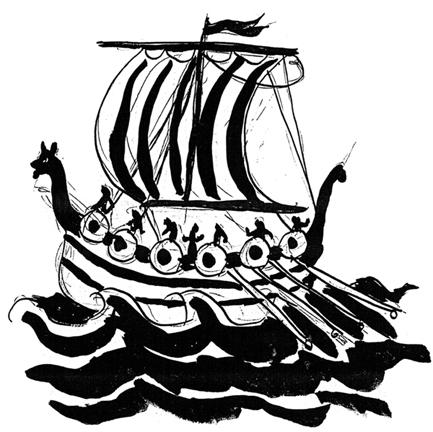
I
ROLF THE LARGE VIKING
AND WHAT HAPPENED NEXT
The story begins in a country where nobody had time to write anything down, as they were too busy finding enough to eat. Unlike some countries at the present day, it was not that there were too many people and not enough food. There were very few people, and plenty of food if you knew how to catch it. There was not, however, much room to grow it. The rivers in the high mountains had for centuries swept all the soil down into the sea, long before man came to inhabit the region. The sea had eaten into the land in long arms called fjords, and on the edge of these there was just enough left to grow a very little corn, grind it and bake it into bread. It was much easier to live on fish. The sea then was full of these, especially cod, which came to the cold northern seas to spawn, lay eggs and hatch them, then go away. However they were nearly always caught, eaten or dried out for stockfish, which doesnt taste anything like it did when it was fresh. Often it was so horrible it had to be sweetened with lavender after life improved. In our day, there are very few cod left, which is not surprising. They have been overfished, and are on the way to becoming a protected species.
This apart, in the time of which we speak it was all right if the weather was calm. Then the men would go out in the boats they had made themselves, dip both hands in the sea and catch as many fish as they needed, throwing them wriggling into the boat; and either making a fire of dry driftwood on the shore to cook and eat them, or else take them home to the trough-fires in their longhouses. These fires were never allowed to go out, as it was difficult to light a fire, but as the longhouses were made of wood, a spark could cause everything to go up in a blaze. One way and another, you had to keep an eye.
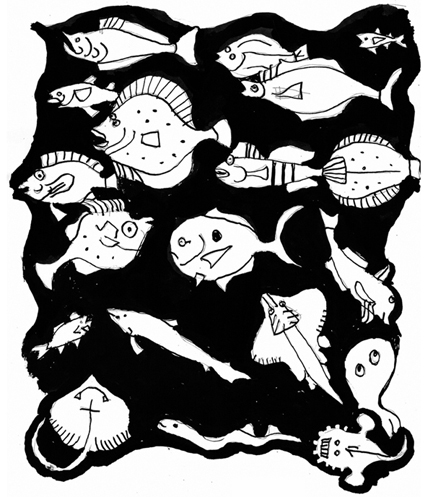
All sorts of fish
If people got tired of fish, they would hunt. The upland forests at first housed plenty of reindeer, which made very good eating. However the reindeer, like the cod, grew scarce, having moved further north where it was even colder and few men cared to live. There was still wild boar, but unlike the reindeer they were fierce and would often kill the man who hunted them, goring him with their fangs.
They would even survive a spear-thrust. One way and another everybody began to want to live and eat safely, as long before they had done in the rich cities of the Baltic.
They had mostly, both men and women, been asked to leave, having become undesirable citizens. It was rather like the convicts who were later sent to Australia, sometimes for a very small crime like stealing a piece of cloth. This earlier land was not Australia; it was Norway, and so ice-bound that it was the last place in the then known world to be lived in by man. Only dropouts and criminals were sent there, or chose to go there. They had to be tough.
In summer, when the light was long and everyone could see what they were doing, living was good as far as it went. However winter was a different matter. Thick frost, ice and snow came, covering the tracks to the jagged high mountains where game lived. Those who could stayed at home by the trough-fires, keeping warm and listening to the skalds singing. A skald was a visiting poet, like the makars of Scotland or the bards of Wales, who recounted the deeds of heroes. For a long time what the skalds sang was believed to be the absolute truth, and it was considered a great honour to be included in the sagas. Generally speaking you had to be dead. A death in war meant you went straight to Valhalla, where the gods lived, and drank mead from drinking-horns until the Day of Ragnarok, after which everything would be different.

